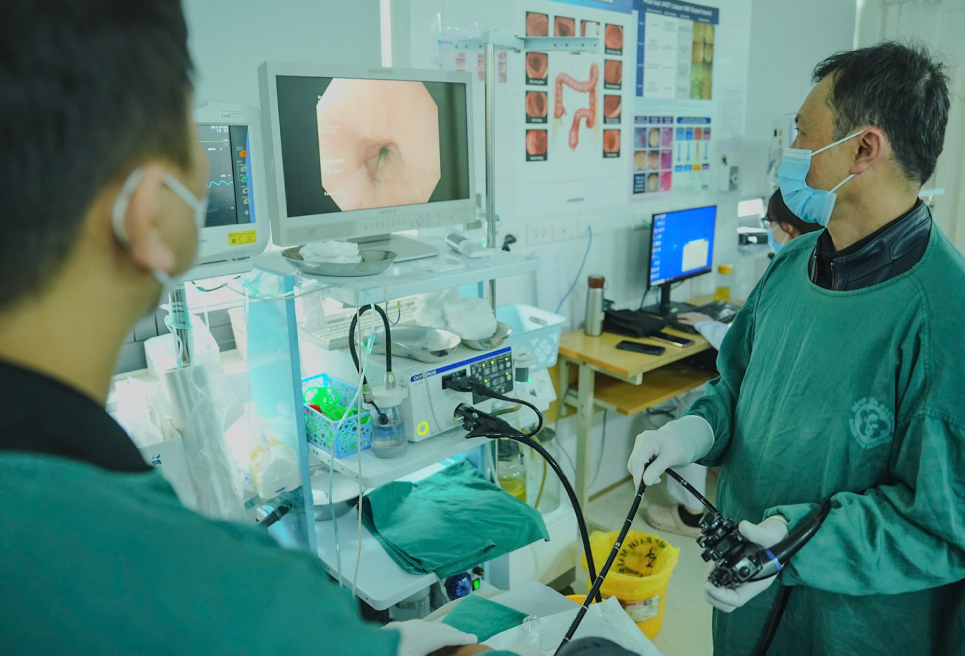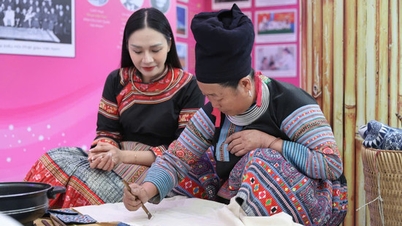
Mr. NAD (26 years old, residing in Hai Phong) came to the Center for Oncology and Nuclear Medicine, Bach Mai Hospital ( Hanoi ) and was diagnosed with colorectal cancer. The patient came to the clinic due to prolonged abdominal pain and fatigue.
Endoscopy results detected a large, ulcerated tumor in the transverse colon, which was determined to be colon adenocarcinoma through pathology.
Through medical history, the doctor found that Mr. D. and his relatives had an unusual genetic history: his father, aunt, paternal uncle and paternal cousin all had colorectal cancer. Gene sequencing tests showed that the patient carried a mutation in the MLH1 gene - one of the important genes that helps repair DNA replication errors, related to Lynch syndrome - a genetic condition that increases the risk of cancer.
According to Associate Professor, Dr. Pham Cam Phuong, Director of the Center for Oncology and Nuclear Medicine, Lynch syndrome occurs when the “gatekeeper” genes (such as MLH1, MSH2, MSH6, PMS2) mutate, losing the ability to repair errors in the DNA replication process. As a result, mutations accumulate rapidly, promoting the formation of malignant tumors. People with this syndrome are at high risk of many types of cancer at a young age, including:
- Colorectal cancer: Risk increases from 1.9% to 52-82% (27-43 times).
- Endometrial cancer (women): Risk increases from 1.6% to 25-60% (15-37 times higher).
- Stomach cancer: Risk increases from 0.3% to 6-13% (20-43 times higher).
- Ovarian cancer (women): Risk from 0.7% to 4-12% (5-17 times higher).
Lynch syndrome is not limited to colorectal cancer but also increases the risk of multiple organ cancers, affecting both men and women.
When the patient was diagnosed with Lynch syndrome, the doctor provided treatment and genetic counseling. In this case, the doctor explained the genetic risks and recommended that relatives, especially the patient's brother, undergo genetic testing. The benefits of testing are to detect risks early and identify carriers of the mutated gene.
People with the mutation should have a colonoscopy every 1-2 years from age 20-25, combined with other screening programs earlier than the general population. Detecting polyps or early-stage cancer increases the cure rate and improves quality of life.
According to experts, gene sequencing not only helps to accurately identify Lynch syndrome but also supports the development of screening and prevention plans for relatives. This syndrome can exist silently without being detected. Therefore, if two or more family members have colorectal, endometrial or stomach cancer, genetic counseling and early genetic testing should be considered.
Doctors also recommend that colorectal cancer screening is especially important in families with people who have the disease. Some of the following factors help prevent this disease: not using tobacco, alcohol and stimulants; regularly exercising and maintaining a reasonable weight.
PV (synthesis)Source: https://baohaiphong.vn/ly-giai-nguyen-nhan-khien-chang-trai-hai-phong-cung-4-nguoi-than-bi-ung-thu-520177.html








![[Photo] Amazing total lunar eclipse in many places around the world](https://vphoto.vietnam.vn/thumb/1200x675/vietnam/resource/IMAGE/2025/9/8/7f695f794f1849639ff82b64909a6e3d)



























































![[Photo] General Secretary To Lam chaired the Politburo's working session with the Standing Committee of the Central Public Security Party Committee](https://vphoto.vietnam.vn/thumb/402x226/vietnam/resource/IMAGE/2025/9/8/c94b4e255b194b939a1c7301893f5447)

































Comment (0)